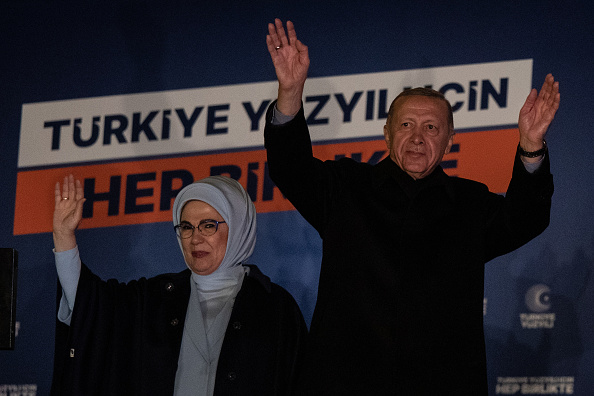The Turkish presidential election is set for a run-off as neither candidate secured the necessary majority.
Incumbent President Recep Tayyip Erdogan and his secular opponent, Kemal Kilicdaroglu, will now confront each other on May 28 in a head-to-head run-off.
Erdogan was facing his most difficult electoral challenge in years, with some polls suggesting Kilicdaroglu was ahead. But a huge turnout of 88% helped him upset the odds.
Erdogan emerged with 49.4% of the votes, closely trailed by Kilicdaroglu at 44.9%.
A third candidate, Sinan Ogan of the ultra-nationalist Ancestor Alliance, secured around 5%. His unexpected success prevented both Erdogan and Kilicdaroglu from achieving an outright victory.
Greeted by crowds of cheering supporters waving flags and banners, President Erdogan appeared on the balcony at AK Party HQ just after 2am with his wife to announce, “We are leading by a clear margin.”
Erdogan also tweeted: “The fact that the May 14 elections took place in the form of a great feast of democracy with peace and quiet is an expression of the democratic maturity of our Turkey.
“While the election was held in such a positive and democratic atmosphere and the vote counting is still going on, trying to announce results hastily means usurpation of the national will. We are pleased that the favour of our nation is reflected in the ongoing vote count.
“I ask all of my litigants and colleagues to stay at the ballot boxes, no matter what, until the results are officially finalised. I congratulate all my citizens who voted in the name of democracy and took part in the election work, and I express my gratitude to each and every one of them.”
Meanwhile, Kilicdaroglu said: “Erdogan didn’t get the vote of confidence from the people. The desire to change in the society is more than 50 percent.”
Big turnout
An estimated 60 million Turkish citizens exercised their right to vote in the election. While Turkish elections typically witness significant turnout, this year’s participation is believed to have been notably higher at nearly 87%.
Erdogan drew support from central and southern regions of Turkey, known for their religious and conservative voter base. His religious background resonates with these areas, solidifying his stronghold.
Despite aspirations of a broader alliance to unite a larger voter coalition, the opposition’s efforts fell short, and smaller parties predicted to garner votes largely went unnoticed. Kilicdaroglu, the secular candidate with pro-Western views, emerged triumphant in numerous liberal coastal areas, Kurdish regions, and major cities.
The stark contrast between Erdogan’s religious appeal and Kilicdaroglu’s appeal to more liberal demographics underscores the ideological divide within Turkey.
For example, Erdogan concluded his final rally with Maghrib prayers at the Hagia Sophia Grand Mosque in Istanbul.
Over his 20-year rule, Erdogan has significantly altered Turkey’s economy, implemented Islamic reforms, and limited the military’s influence. He is also recognised for enhancing Turkey’s global standing.
Earlier in the week, he was backed by fifty Islamic scholars from across the globe who pointed to his “substantial benefits to Muslims.”
But critics say his popularity has experienced a decline in recent years due to the country’s economic challenges and accusations of undemocratic actions.


















